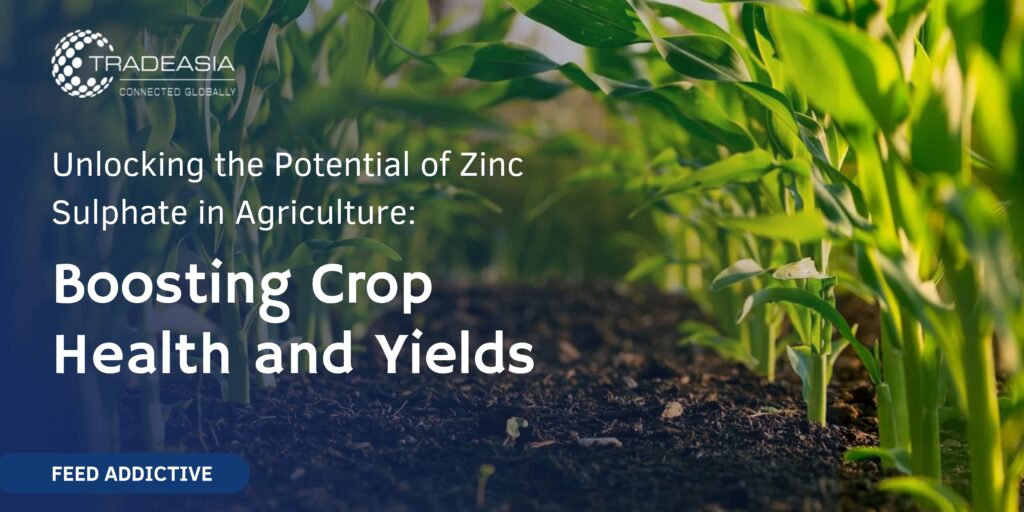
Agriculture has long been the backbone of human civilization, providing nutrition and livelihoods for billions of people. However, as the world’s population continues to grow, the demand for food is greater than ever. To meet this need, farmers must find ways to increase crop productivity and improve the nutritional quality of their products. This is where zinc sulfate, a chemical compound with a centuries-old history, plays an important role. In this article, we will explore the remarkable benefits of zinc sulfate in agriculture, its applications and the science behind its success.
Zinc sulfate: The magic of micronutrients
Zinc, often called a “micronutrient,” is a mineral that plants need in relatively small amounts compared to macronutrients such as nitrogen, phosphorus and potassium. But its importance is no less important. Zinc is important for various plant functions, including enzyme activation, protein synthesis and photosynthesis. It participates in the formation of growth hormones and chlorophyll, which are essential for healthy plant growth.
Zinc deficiency in soils
Despite its importance, zinc deficiency is a common problem in many soils around the world. This deficiency can lead to stunted growth, reduced crop yields, and reduced nutritional quality of food crops. In areas where crops are grown on zinc-deficient soils, addressing this zinc deficiency is critical to ensuring food security and agricultural sustainability.
Zinc sulfate: Solution to overcome zinc deficiency
Enter zinc sulfate, chemically expressed as ZnSO4. This compound is soluble in water and provides plants with a readily available source of zinc. Its application to soil or foliage effectively combats zinc deficiency, bringing many benefits to both the plants and the farmers who grow them.
Benefits of Zinc Sulphate in Agriculture Improves Crop Yields:
One of the most important benefits of zinc sulfate is its ability to increase crop yields. By providing essential zinc to plants, it helps them reach their maximum growth potential, resulting in more abundant harvests.
- Improved nutritional value: Crops enriched with zinc not only produce higher yields but are also more nutritious. Zinc is a key element in the synthesis of proteins and other important plant compounds, contributing to improving the nutritional quality of harvested products.
- Disease resistance: Zinc strengthens the immune system of plants, helping plants become more resistant to diseases. This could lead to a reduced need for chemical pesticides, contributing to more sustainable and environmentally friendly agricultural practices.
- Optimal Photosynthesis: Zinc is important for the production of chlorophyll, central to the process of photosynthesis. This means that plants with enough zinc can effectively convert sunlight into energy, resulting in healthier, greener crops.
Application methods
Zinc sulfate can be applied by a variety of methods, depending on the specific crop and local soil conditions. These methods include:
- Soil application: Zinc sulfate can be incorporated into the soil during or after planting to compensate for zinc deficiencies. It is essential to ensure proper distribution and avoid over-fertilization as excess zinc can have adverse effects on plant health.
- Foliar spray: In some cases, foliar spray zinc sulfate may be used to compensate for immediate deficiencies or to replenish the soil. This method provides a quick source of zinc directly to the leaves.
- Seed Treatment: Some crops benefit from seed treatment with zinc sulfate. This involves coating the seeds with a thin layer of the compound before planting, ensuring that young plants have early access to zinc.
Sustainable Agriculture
The use of zinc sulfate in agriculture is consistent with the principles of sustainable agriculture. By addressing nutrient deficiencies and improving crop yields, it reduces the need for intensive land use and chemical fertilizers. This in turn contributes to creating an agricultural system that is environmentally friendly and uses resources more efficiently.
Global impact of zinc sulfate
Zinc sulfate is not limited to a particular region or crop type. Its global impact is felt across diverse agricultural regions, from the rice fields of Asia to the cornfields of Africa. It plays an important role in improving food security, especially in areas where soil zinc deficiency is common.
Challenges and considerations
While the benefits of zinc sulfate in agriculture are significant, it is essential to consider some of the challenges and best practices:
- Applications Suitable: Determining dosage and application method is critical, correct application is based on soil analysis and specific crop needs. Too much fertilization can lead to zinc poisoning, which is harmful to plants and the environment.
- Environmental Impact: Zinc, like any nutrient, must be carefully managed to avoid runoff into waterways, where it can cause ecological problems.
- Specific crop requirements: Not all crops require zinc supplementation and excess zinc can be detrimental. Therefore, it is essential to tailor the use of zinc sulfate to specific soil and crop conditions.
Conclusion
Zinc sulfate, with its ability to combat zinc deficiency and improve plant health and yield, demonstrates the potential of chemistry in agriculture. As the world faces the challenge of feeding a growing population, the importance of zinc sulfate is becoming increasingly clear. This not only ensures an abundant food supply but also contributes to improving the nutritional quality of the food we consume. In the face of global food safety issues, zinc sulfate is a valuable ally, helping farmers grow healthier crops and have a more sustainable future.
